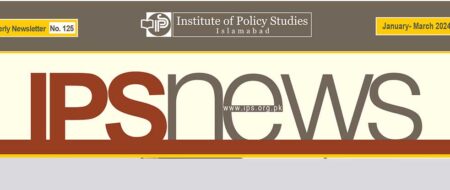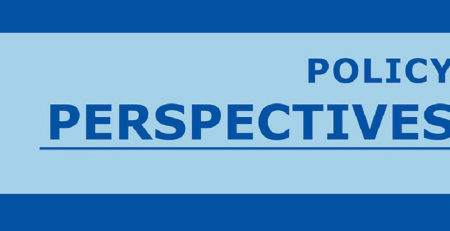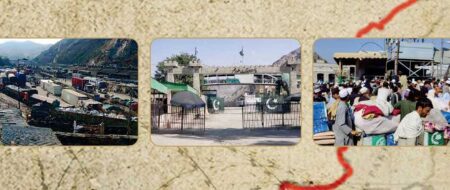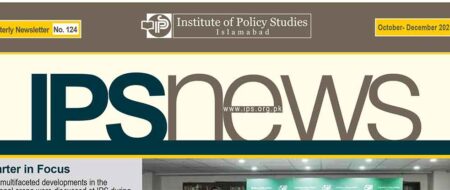Policy Perspectives (Vol 15, No. 2)
| Chief Editor: | Khalid Rahman |
| Volume: | 15 |
| Number: | 2 |
| Pages: | 148 |
| Retail Price (Pak): | PKR600 |
| Annual Subscription: | PKR1000 |
| Export Price: | $60 (per copy) |
| Annual International Subscription: | $120 |
About the Issue
The latest edition of peer-reviewed IPS’ flagship journal Policy Perspectives – disseminating the research carried out by IPS and its associates on diverse range of current and evolving topics – is out now and is widely available for the readers in Pakistan and abroad.
The issue combines deliberations upon important global theoretical debates as well as discourse on current regional and international matters of significance.
The first article ‘Cyber Threat in Interstate Relations: Case of US-Russia Cyber Tensions’ – which is contributed by Dr Muhammad Riaz Shad, assistant professor, Department of International Relations, National University of Modern Languages (NUML), Islamabad – briefly analyses ‘cyber threat’ as the most advance and complicated peril of 21st century. The article first explains the degree of seriousness of cyber threat in interstate relations, then it illustrates the impact of alleged Russian cyber intrusion into the US electoral system on US-Russia relations, and zeroes in on the underlying cyber issues between them.
The second article ‘Sino-Indian Border Conflict 2017 and Its Implications for Bilateral Relations’ – which is written by Maira Qaddos, a Ph.D. scholar at the Institute of Communication Studies, University of the Punjab, Lahore – sheds light on the growing tension between the two rivals China and India. The piece states that the two countries are collaborating with each other in multiple sectors, but at the same time they are unable to resolve their border disputes. The paper recommends that both the nations have to work on some permanent solutions for the resolution of their territorial disputes because they may sabotage the peace process anytime.
The third piece ‘The Indo-Russian Strategic Partnership and India’s Cold Start Doctrine’ – which is jointly contributed by Summar Iqbal Babar, lecturer, School of Politics and International Relations, Quaid-i-Azam University, Islamabad, Masood Ur Rehman Khattak, lecturer, Department of Politics and International Relations, International Islamic University, Islamabad, and Mujahid Hussain Sargana, senior lecturer, Department of Humanities and Social Sciences, Bahria University Islamabad – studies the Indian military’s doctrinal shift, massive military modernization and operationalization of the Cold Start Doctrine (CSD) against Pakistan. The study is divided in two parts: i) The first part focuses on the strategic outlook of South Asia and the Indian military’s rationale to operationalize CSD, ii) The second part emphasizes on the strategic partnership between India and Russia.
The next paper ‘Liquidity Management Mechanisms of Islamic and Conventional Finance: A Shari’ah Appraisal’ – which is a combined effort of Sheikh Rafiullah, Ph.D. (IBF) scholar at International Islamic University, Islamabad, and Dr Atiquzzafar Khan, assistant professor, IIIE, International Islamic University, Islamabad – analyses liquidity management mechanisms of Islamic and conventional finance from a Shari’ah perspective. This paper also suggests some Shari’ah compliant liquidity management instruments, such as: (i) an IFI can issue NCDs against a portfolio of bank’s assets, (ii) Any corporation can issue asset-backed Sukūk, which can be used by IFIs for liquidity management purposes.
The next article ‘Sustained Economic Growth: Prospects from Efficiency Analysis of Exporting and Non-Exporting Pakistani Firms’ by Mamona Sadaf and Arshia Ishaq, the lecturers of Economics at the University of Management and Technology, Sialkot, analyses exporting and non-exporting Pakistani firms, attempting to estimate technical and scale efficiencies among them. The efficiency analysis aims to help identify potential changes which industry may require for its consistent growth in the current surge of global competition and nationalization.
The following piece ‘Revamping Higher Education Research in Pakistan’ – which is contributed by Dr. Fayyaz Ahmad Faize, assistant professor, Humanities Department, COMSATS University, Islamabad , Prof Dr Adnan Sarwar Khan, head of the Department of International Relations, NUML University, Islamabad, and Dr Inayat Kalim, in-charge, International Relations Program, COMSATS Institute of Information Technology, Islamabad – gives suggestions to improve higher education in Pakistan. The data for this study was collected from 655 faculty members selected from six universities through an open-ended questionnaire.
Jointly authored by Naveed Yousaf, Ph.D. scholar, Department of Public Administration, University of Karachi, Dr Muhammad Bashir Khan, assistant professor, Department of Government & Public Policy, National Defence University, Islamabad, and Shahzad Hussain, assistant professor, Department of Government and Public Policy, Faculty of Contemporary Studies, National Defence University, Islamabad, the paper ‘Rehabilitating North Waziristan’ maintains that despite huge financial and human resources pooled to rehabilitate the war effected area, no fruitful results have yet been achieved. Reasons being that the development activities of all the developing partners are not coordinated, planned and according to the ground realities shaped by war and insurgency. To mainstream the people and the area, a robust development strategy keeping in view the ground situation in mind is required.
The articles are followed by a book review by Dr. Muhammad Reza Kazimi, who appraises the IPS Press’ publication ‘Awakened China Shakes the World and is now Pakistan’s Mainstay’. Written by Amb (r) Mohammed Yunus – a Pakistani diplomat who witnessed and took active part in laying the foundations and building the historic relationship between China and Pakistan, the book is an insightful and fascinating personal account of author’s rich memories and experiences from his eventful diplomatic assignments during 1953-1982.
The issue also contains the summaries of various dialogues that were held at IPS during the period including ‘Higher Education in Pakistan: Status, Trends and Prospects’, ‘Pak-Iran Relations’, ‘Kashmir: Today and Tomorrow’, ‘Status of Petroleum E&P in Pakistan: A Deliberation on Future Strategy’, ‘The Fourth Industrial Revolution: Implications for Pakistan’, ‘Educational Dialogue Forum: Pakistan at 70 – National Agenda for Education’, ‘Review meeting of the draft National Education Policy for Pakistan (2017)’, ‘UN resolutions on Kashmir: An Insight’, ‘Policy dialogue on Afghan refugees in Pakistan’, ‘Pakistan and its Neighbors: A Foreign Policy Analysis’, ‘ The Dynamics of the Fourth Industrial Revolutions: Opportunities for Pakistan’, ‘Pluralism vs Exclusionism: The Case of Rising Extremism in India’, ‘Media Trends, Media’s Depiction of Pakistan, and its Impact’, ‘Emerging Regional and Global Scenario: A Perspective from Iran’, and ‘National Water policy: An Appraisal’.
It is pertinent to mention here that alongside the printed copies, Policy Perspectives is also available online to the global audience through Pluto Journals on JSTOR (http://www.jstor.org/journal/polipers) and on Factiva and affiliated international databases through Asianet-Pakistan. Moreover, it is also indexed in International Political Science Abstracts (IPSA) database through both the print edition (published by Sage) and on the Ebsco and Ovid websites.
Contents
|
||
| Editor’s Note | 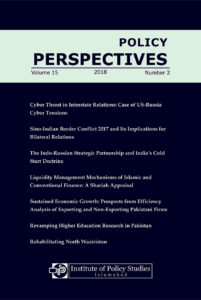 |
|
| Cyber Threat in Interstate Relations: Case of US-Russia Cyber Tensions
Dr. Muhammad Riaz Shad |
||
| Sino-Indian Border Conflict 2017 and Its Implications for Bilateral Relations
Maira Qaddos |
||
| The Indo-Russian Strategic Partnership and India’s Cold Start Doctrine
Summar Iqbal Babar, Masood ur Rehman Khattak and Mujahid Hussain Sargana |
||
| Liquidity Management Mechanisms of Islamic and Conventional Finance: A Shariah Appraisal
Sheikh Rafiullah, Dr. Atiquzzafar Khan |
||
| Sustained Economic Growth: Prospects from Efficiency Analysis of Exporting and Non-Exporting Pakistani Firms
Mamona Sadaf & Arshia Ishaq |
||
| Revamping Higher Education Research in Pakistan
Dr. Fayyaz Ahmad Faize, Prof. Dr. Adnan Sarwar Khan and Dr. Inayat Kalim |
||
| Rehabilitating North Waziristan
Naveed Yousaf, Muhammad Bashir Khan and Shahzad Hussain |
||
| Book Review
Dr. Muhammad Reza Kazimi |
||
| Summary of Dialogues at IPS | ||





